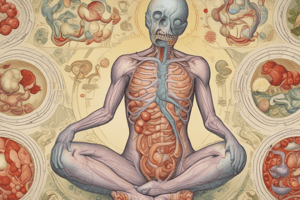Podcast
Questions and Answers
What is hunger primarily motivated by?
What is hunger primarily motivated by?
Survival
Which part of the brain is the primary control center for hunger?
Which part of the brain is the primary control center for hunger?
Hypothalamus
What hormone is known as the 'hunger hormone'?
What hormone is known as the 'hunger hormone'?
Ghrelin
Leptin signals the brain about short-term energy storage.
Leptin signals the brain about short-term energy storage.
Signup and view all the answers
What effect can low blood glucose levels have on hunger?
What effect can low blood glucose levels have on hunger?
Signup and view all the answers
The set-point theory suggests that each individual has a genetically determined ______________ for body weight.
The set-point theory suggests that each individual has a genetically determined ______________ for body weight.
Signup and view all the answers
Which of the following can influence hunger? (Select all that apply)
Which of the following can influence hunger? (Select all that apply)
Signup and view all the answers
What is 'emotional eating'?
What is 'emotional eating'?
Signup and view all the answers
Cognitive processes have no impact on hunger regulation.
Cognitive processes have no impact on hunger regulation.
Signup and view all the answers
What role does memory play in eating behavior?
What role does memory play in eating behavior?
Signup and view all the answers
In anorexia nervosa, individuals suppress their hunger despite the body's signals indicating a need for nourishment.
In anorexia nervosa, individuals suppress their hunger despite the body's signals indicating a need for nourishment.
Signup and view all the answers
What is binge eating disorder characterized by?
What is binge eating disorder characterized by?
Signup and view all the answers
Study Notes
Hunger as a Biological Motivation
- Hunger is a fundamental biological drive for survival, motivating organisms to seek food and maintain energy balance.
- Hunger is a complex interaction of biological, cognitive, and environmental factors.
Physiological Basis of Hunger
- The brain and hormones regulate hunger.
-
Hypothalamus: The primary control center for hunger.
- Lateral Hypothalamus (LH): Activates hunger sensations and motivates food-seeking.
- Ventromedial Hypothalamus (VMH): Signals satiety (feeling full).
- Ghrelin: Secreted by the stomach, signals hunger to the brain. Levels increase before meals and decrease after.
- Leptin: Secreted by fat cells, informs the brain about long-term energy storage. Higher levels lead to less hunger.
- Blood Glucose Levels: Low levels trigger hunger as the body needs glucose for energy.
Homeostasis and Set-Point Theory
- Hunger regulation strives to maintain energy balance in the body.
- Set-point theory: Each individual has a genetically determined body weight set-point that the body attempts to maintain.
Psychological and Environmental Influences
- Psychological and environmental factors influence eating behavior, even though hunger is biologically driven.
- External Cues: Environmental factors like sight, smell, and time of day influence hunger.
- Emotional State: Emotions such as stress can impact or modulate hunger.
- Learned Behavior: Learned associations between certain foods and feelings of pleasure can lead to habitual eating patterns.
The Role of Cognitive Factors
- Cognitive processes, including attention, memory, and decision-making, are involved in hunger regulation.
- Cognitive Restraint: Deliberate attempts to control eating can lead to cycles of restriction and overeating.
- Memory and Eating: Memory of recent meals influences subsequent hunger.
Biological Theories of Eating Disorders
- Eating disorders like anorexia nervosa and binge eating disorder result from disruptions in hunger and satiety mechanisms.
- Anorexia Nervosa: Individuals suppress hunger and restrict food intake despite physiological needs.
- Binge Eating Disorder: Individuals lose control over food consumption, often due to emotional stress.
Evolutionary Perspective on Hunger
- Hunger and eating behaviors are adaptive mechanisms for ensuring survival, particularly during food scarcity.
Thirst as a Biological Motivation
- Thirst is a fundamental biological drive for survival.
- Homeostasis: Thirst helps maintain fluid balance.
-
Hypothalamus: Central to thirst regulation, containing osmoreceptors.
- Osmoreceptors: Detect changes in cellular fluid, triggering thirst responses.
- Osmotic Thirst: Triggered by high solute concentration in extracellular fluid.
- Hypovolemic Thirst: Triggered by reduced blood volume or pressure.
Motivational Aspects of Thirst
- Thirst is a powerful motivator for behavior, prompting actions to obtain water.
- Anticipatory Drinking: The body can initiate drinking before dehydration becomes critical.
Thirst and Psychosocial Factors
- Psychological and environmental factors influence water intake.
- Polydipsia: Excessive drinking often seen in schizophrenia or obsessive-compulsive disorders.
- Learning: Learned behaviors like associating certain cues (e.g., after meals) with drinking habits.
Disorders Related to Thirst
- Diabetes Insipidus: Deficiency in vasopressin or kidney response causing excessive thirst and urination.
- Syndrome of Inappropriate Antidiuretic Hormone (SIADH): Causes the body to retain water and decreases thirst.
Studying That Suits You
Use AI to generate personalized quizzes and flashcards to suit your learning preferences.
Related Documents
Description
This quiz explores the biological and physiological mechanisms behind hunger. Understand the role of the hypothalamus, hormones like ghrelin and leptin, and how they contribute to regulating hunger and energy balance. Test your knowledge on the complex interactions that drive this essential biological motivation.




